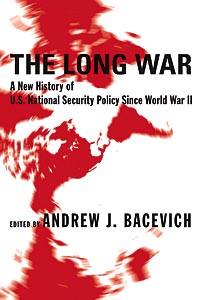Andrew J. Bacevich on Iraq, Afghanistan, and Pakistan
Where We Fall Down

Andrew J. Bacevich was an early and prominent critic of the war in Iraq. A graduate of West Point, a Vietnam veteran, and a conservative Catholic, Bacevich has argued in a number of widely read essays and op-eds that the invasion of Iraq was illicit and imprudent and is deflecting attention from the larger fight against terrorism. Bacevich is a professor of international relations at Boston University. He has written several books; his last, The New American Militarism, is an account of the role of the military in American culture. Last May, Bacevich’s son, also named Andrew Bacevich, was killed in action in Iraq. The younger Bacevich, a First Lieutenant in the army, was 27. I spoke with Andrew Bacevich by telephone; our conversation has been edited and condensed.
Your lecture at UCSB is titled “Iraq-Managing the Consequences of Failure,” and you recently wrote in the Washington Post that at best the “surge” has created a stalemate. Why isn’t the surge the success it has been touted as by members of the Bush administration, and very prominently at the moment, by John McCain? The purpose of the surge, as it was explained by its architects, was to create the opportunity for Iraqis to negotiate some kind of political reconciliation that would bring the conflict to an end. It is certainly true that the surge reduced the occurrence of violence in Iraq. But it has not brought about that political reconciliation. Iraq has become a dependency of the United States, rather than a sovereign nation able to manage its own affairs.

Defense Secretary Robert Gates has been talking about a “pause” in the surge. What do you think we should do in Iraq? My view is that the war is militarily un-winnable, and to continue to pay something in the order of about $2 billion to $3 billion a week to continue to lose 30 to 40 American lives a month is a bad investment. It’s a misuse of our resources, resources that ought to be used elsewhere-for example, Afghanistan. I think we ought to end U.S. combat involvement in Iraq [and] we ought to get serious about putting together a coalition of nations who share a common interest in ensuring that the fate of Iraq doesn’t pull the rest of the region down behind it. It seems to me that almost everybody in the region, including the Iranians, have a common interest in stability.
You didn’t support the invasion of Iraq in part because you found the idea of preventive war morally questionable and pragmatically reckless. What do you think Iraq has taught us about preventive war? Remarkably little. So much of the debate about Iraq has focused specifically on Iraq, rather than trying to put this experience in a larger context. I’m struck by the relative absence of debate about whether or not the Bush doctrine of preventive war is a good idea and should be continued in the next administration, or whether it’s a bad idea and should be abrogated.
You have argued that Iraq is deflecting attention away from Afghanistan. Why is Afghanistan more important, in a strategic sense, than Iraq? Afghanistan and Pakistan together provide probably the richest opportunity for Al Qaeda to take root, to recruit, and to reconstitute itself. And I’m emphatically including Pakistan alongside Afghanistan. Pakistan is probably the most dangerous place in the world as far as our own security is concerned.
Are the recent elections in Pakistan a good thing for American interests in the region, or a bad thing? I think it’s too soon to tell. We bet on the wrong horse when we put so much emphasis on [Pakistani President Pervez] Musharraf. But whether or not those who defeated Musharaff in the election will be useful allies-it’s just too soon to tell.
I’m of draft age; Americans my age are fighting and dying in a war that has little appreciable impact on my daily life. I’m wondering how young Americans should be engaged with the war. Are we engaged enough? I know you’ve had a very personal experience of this issue. I would say you’re not. Let me rephrase that. It’s not simply a problem of young people; it’s a problem of citizens not being engaged, no matter their age. This call to support the troops, or the insistence that we all support the troops, is very hollow. It doesn’t entail any obligations. I believe we should support the troops, but it ought to be a support in which we are attentive to the burdens that are imposed upon them when they are sent on these cockamamie missions.
The sense of obligation is not one that should have you or people of your generation feeling guilty if they’re not running down to the local recruiter to sign up. But it’s a sense of obligation in which we should demand of our political leaders that our army not be subjected to the kinds of abuses it’s being subjected to. It’s a political engagement that is required here, and that seems to be where we all fall down.
4•1•1
Andrew J. Bacevich will deliver a free public lecture, Iraq-Managing the Consequences of Failure, at 8 p.m. on Monday, March 10, at UCSB’s Campbell Hall. For more information, call 893-3535 or visit artsandlectures.ucsb.edu.



